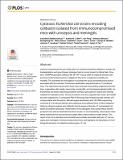| dc.contributor.author | Wert, Katherine J. | |
| dc.contributor.author | Jacobsen, Johanne T. | |
| dc.contributor.author | Victora, Gabriel | |
| dc.contributor.author | Jaenisch, Rudolf | |
| dc.contributor.author | Bakthavatchalu, Vasudevan | |
| dc.contributor.author | Feng, Yan | |
| dc.contributor.author | Mannion, Anthony | |
| dc.contributor.author | Ge, Zhongming | |
| dc.contributor.author | Garcia, Alexis | |
| dc.contributor.author | Scott, Kathleen | |
| dc.contributor.author | Caron, Tyler | |
| dc.contributor.author | Madden, Carolyn | |
| dc.contributor.author | Fox, James G | |
| dc.date.accessioned | 2018-04-24T18:17:49Z | |
| dc.date.available | 2018-04-24T18:17:49Z | |
| dc.date.issued | 2018-03 | |
| dc.date.submitted | 2017-08 | |
| dc.identifier.issn | 1932-6203 | |
| dc.identifier.uri | http://hdl.handle.net/1721.1/114941 | |
| dc.description.abstract | This is an open access article distributed under the terms of the Creative Commons Attribution License, which permits unrestricted use, distribution, and reproduction in any medium, provided the original author and source are credited. Immune-compromised mouse models allow for testing the preclinical efficacy of human cell transplantations and gene therapy strategies before moving forward to clinical trials. However, CRISPR/Cas9 gene editing of the W sh /W sh mouse strain to create an immune-compromised model lacking function of Rag2 and Il2rγ led to unexpected morbidity and mortality. This warranted an investigation to ascertain the cause and predisposing factors associated with the outbreak. Postmortem examination was performed on 15 moribund mice. The main lesions observed in these mice consisted of ascending urogenital tract infections, suppurative otitis media, pneumonia, myocarditis, and meningoencephalomyelitis. As Escherichia coli strains harboring polyketide synthase (pks) genomic island were recently isolated from laboratory mice, the tissue sections from the urogenital tract, heart, and middle ear were subjected to E. coli specific PNA-FISH assay that revealed discrete colonies of E. coli associated with the lesions. Microbiological examination and 16S rRNA sequencing confirmed E. coli-induced infection and septicemia in the affected mice. Further characterization by clb gene analysis and colibactin toxicity assays of the pks+ E. coli revealed colibactin-associated cytotoxicity. Rederivation of the transgenic mice using embryo transfer produced mice with an intestinal flora devoid of pks+ E. coli. Importantly, these barrier-maintained rederived mice have produced multiple litters without adverse health effects. This report is the first to describe acute morbidity and mortality associated with pks+ E. coli urosepsis and meningitis in immunocompromised mice, and highlights the importance of monitoring and exclusion of colibactin-producing pks+ E. coli. | en_US |
| dc.description.sponsorship | National Institutes of Health (U.S.) (Grant T32OD010978) | en_US |
| dc.description.sponsorship | National Institutes of Health (U.S.) (Grant P30ES002109) | en_US |
| dc.description.sponsorship | National Science Foundation (U.S.) (Grant R01OD011141) | en_US |
| dc.publisher | Public Library of Science | en_US |
| dc.relation.isversionof | http://dx.doi.org/10.1371/journal.pone.0194443 | en_US |
| dc.rights | Creative Commons Attribution 4.0 International License | en_US |
| dc.rights.uri | https://creativecommons.org/licenses/by/4.0/ | en_US |
| dc.source | PLoS | en_US |
| dc.title | Cytotoxic Escherichia coli strains encoding colibactin isolated from immunocompromised mice with urosepsis and meningitis | en_US |
| dc.type | Article | en_US |
| dc.identifier.citation | Bakthavatchalu, Vasudevan et al. “Cytotoxic Escherichia Coli Strains Encoding Colibactin Isolated from Immunocompromised Mice with Urosepsis and Meningitis.” Edited by Paulo Lee Ho. PLOS ONE 13, 3 (March 2018): e0194443 © 2018 Bakthavatchalu et al | en_US |
| dc.contributor.department | Massachusetts Institute of Technology. Division of Comparative Medicine | en_US |
| dc.contributor.mitauthor | Bakthavatchalu, Vasudevan | |
| dc.contributor.mitauthor | Feng, Yan | |
| dc.contributor.mitauthor | Mannion, Anthony | |
| dc.contributor.mitauthor | Ge, Zhongming | |
| dc.contributor.mitauthor | Garcia, Alexis | |
| dc.contributor.mitauthor | Scott, Kathleen | |
| dc.contributor.mitauthor | Caron, Tyler | |
| dc.contributor.mitauthor | Madden, Carolyn | |
| dc.contributor.mitauthor | Fox, James G | |
| dc.relation.journal | PLOS ONE | en_US |
| dc.eprint.version | Final published version | en_US |
| dc.type.uri | http://purl.org/eprint/type/JournalArticle | en_US |
| eprint.status | http://purl.org/eprint/status/PeerReviewed | en_US |
| dc.date.updated | 2018-04-20T18:12:00Z | |
| dspace.orderedauthors | Bakthavatchalu, Vasudevan; Wert, Katherine J.; Feng, Yan; Mannion, Anthony; Ge, Zhongming; Garcia, Alexis; Scott, Kathleen E.; Caron, Tyler J.; Madden, Carolyn M.; Jacobsen, Johanne T.; Victora, Gabriel; Jaenisch, Rudolf; Fox, James G. | en_US |
| dspace.embargo.terms | N | en_US |
| dc.identifier.orcid | https://orcid.org/0000-0002-3398-6350 | |
| dc.identifier.orcid | https://orcid.org/0000-0002-2007-8724 | |
| dc.identifier.orcid | https://orcid.org/0000-0001-9307-6116 | |
| mit.license | PUBLISHER_CC | en_US |
